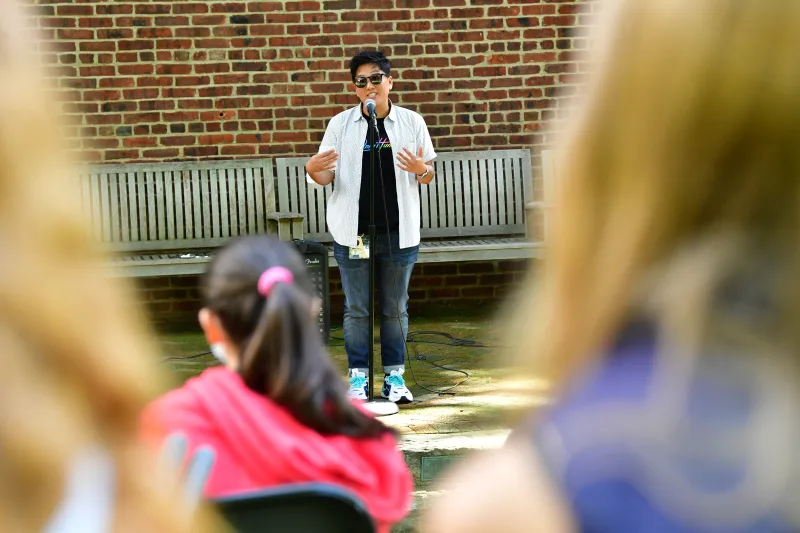Central to the Ethical Culture Fieldston School’s mission is the preparation and education of all students to engage with others in a way that is empathetic, compassionate, and understanding. We sat down with Arhm Wild, Director of the Progressive Teaching Institute and Upper School Diversity, Equity, and Inclusion Coordinator, to learn about establishing a Gender Support Plan at ECFS.
What role does the Diversity, Equity, and Inclusion department play?
ECFS’s Diversity, Equity, and Inclusion (DEI) department, led by Director of Community and Inclusion Russell Marsh, collaborates to provide resources and teacher-training that will foster a thoughtful and supportive learning environment for all students. One such resource is a carefully constructed — and often adjusted — Gender Support Plan.
At the beginning of the 2017–2018 academic year, several of the restrooms at ECFS were converted to gender-neutral bathrooms. Wild and Marsh developed and ran a training around gender-inclusive bathrooms to answer questions they anticipated would arise: Why is it important to have gender-neutral bathrooms? What are some common misunderstandings? They relayed the most common explanations for why people oppose them and provided facts and research to clarify that this opposition is often rooted in fear, not reality. That same year, the DEI team dove into creating ECFS’s first Gender Support Plan.
What are Gender Support Plans?
Gender Support Plans (GSPs) enable schools to thoughtfully address the needs of transgender and nonbinary students. The goal is to establish shared understandings about how a student’s gender will be recognized and supported at school. Wild and Marsh recognized there wasn’t a formalized plan in place to support gender-diverse students. “We had a couple of students at that point who did identify as nonbinary, and we wanted a very clear protocol that people could go to. Something that would be consistent and transparent,” explains Wild. They began by reaching out to educators across the city to see if other schools had implemented a GSP like the plan they envisioned for ECFS. Many of the teachers and administrators Wild spoke with explained that their schools hadn’t yet created a similar resource for transgender and nonbinary students, but were enthusiastic about learning how such a plan would function. “We realized we needed to start developing a plan. This formalized gap in support existed across the city,” says Wild.
The first iteration of the GSP was a series of questions and answers based on resources from the Gender Spectrum that would anticipate a wide range of student needs. The plan was broken down into categories, with each category tailored to different involved parties including administration, teachers, advisors, deans, and parents/guardians. Gender-based policies, rules, and practices can marginalize, stigmatize, and exclude students who identify as transgender, nonbinary, or gender queer. “Consistency is a way towards equity and so we wanted to develop a protocol to respond to different student needs,” explains Wild.
Wild, prioritizing equity, didn’t want to pathologize being nonbinary or transgender: “We also don’t want to automatically assume that nonbinary and trans students are not going to be accepted at home or assume what their challenges will be, which is why we wanted to create a plan that could be customized to each student.” Their goal was to formalize a process while providing 360-degree support.
How does ECFS weave identity development into the curriculum?
Developing identity is fundamental to academic programming at ECFS. The School advocates for student-centered learning grounded in ethical education. In Ethics classes, which begin when students enter Kindergarten, teachers introduce concepts of identity and perspective, and how differences among their peers can be celebrated and supported. In 1st and 2nd Grade, these skills surrounding perspective taking are nurtured, and students learn how they can advocate for others. While students are learning how to support their peers, they are strengthening the skills necessary for developing and expressing their own identities.
Ethics classes aim to empower students by cultivating an inclusive, joyful, and challenging space. By the time students reach 5th Grade, they have a strong sense of personal identity and understand how their individuality can impact the spaces they share in their community. The conversation surrounding identity broadens to consider injustice, personal rights, and social movements. Students contemplate and discuss how these movements impact their own identities and how their experiences can be different from those of their peers. They are encouraged to grapple with different ethical dilemmas and develop the tools to lead with empathy, compassion, and kindness.
How has ECFS’s Gender Support Plan evolved?
Since ECFS’s first GSP was introduced in 2017, the DEI team has made several modifications to better support nonbinary and transgender students. The most recent iteration was adjusted this academic year.
Foundational to learning at ECFS is a sense that each student’s experience is “personalized, differentiated, challenging, and supportive.” As the GSP was put into practice, Wild understood that the plan could not be one-size-fits-all. “Every gender diverse and expansive student isn’t going to have the same needs and desires. Some kids are going to be fully supported at school and at home and don’t really need much support from us. They just want to update their name and pronouns in the system. Others may not be out and could be struggling with other challenges coupled with anxiety surrounding their gender identity. Things are going to be very different for everyone,” says Wild. For that reason, Wild adjusted the plan to make sure it was customizable to each student and their needs.
When a student expresses their authentic gender identity, it represents a turning point in their development. This process could mark certain changes, whether through the student’s outward appearance, going by a new name or pronoun, or their social relationships. It is the School’s responsibility to help the student and support them so that this may be a fundamental moment for both the young person and the entire school community. The School is also complying with the New York State GENDA law, which prohibits discrimination on the basis of gender identity or expression and states that schools must respect students’ names and pronouns.
Who has been involved in the GSP at ECFS?
Every change or adjustment made to the GSP is a cooperative effort that involves many moving parts. According to Wild, it requires an all-hands-on-deck approach. They explain how they involved the entire student support team in the process including counselors, nurses, the Technology team, Principals, Assistant Principals, and Deans. Wild worked closely with the Technology team to determine the different gender fields that needed to be added to the student information system so that various gender options were available to the students. In addition to school-wide changes, there is a slightly different plan for each division to ensure the resources provided are developmentally appropriate for each division. “The plan is comprehensive and never loses sight of the student’s best interest,” explains Wild.
After they adjusted the GSP and discussed the protocol with faculty and staff, Wild began to think about how they would inform students. They emphasize how important it is that students know what resources are available and how to access these resources should they need support.
What are the next steps?
Wild anticipates that several more changes will be made to the GSP in years to come as they learn more from what their students need. They hope the conversation around gender diversity and inclusivity will be ongoing.
One thing is clear: students remain at the forefront of the work Wild does each day. “With this plan, we want to support students who need it, but we also wanted to say, ‘Hey, people’s identities are fluid.’ We want them to understand, especially because they are teenagers, that they are going to learn new things about themselves every day. We just want our students to feel supported in a way that they can see themselves clearly and that they feel confident in who they are. That’s what is important to me.”




